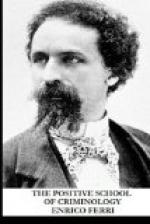Crime has its natural causes, which lie outside of that mathematical point called the free will of the criminal. Aside from being a juridical phenomenon, which it would be well to examine by itself, every crime is above all a natural and social phenomenon, and should be studied primarily as such. We need not go through so hard a course of study merely for the purpose of walking over the razor edge of juristic definitions and to find out, for instance, that from the time Romagnosi made a distinction between incompleted and attempted crime rivers of ink have been spilled in the attempt to find the distinguishing elements of these two degrees of crime. And finally, when the German legislator concluded to make no distinction between incompleted and attempted crime and to recognize only the completed crime in his code of 1871, we witnessed the spectacle of Carrara praising that legislator for leaving that subtile distinction out of his code. A strange conclusion on the part of a science, which cudgels its brains for a century to find the marks of distinction between attempted and incompleted crime, and then praises the legislator for ignoring it. And another classic jurist, Buccellati, proposed to do away with the theory of attempted crime by simply defining it as a crime by itself, or as—a violation of police laws! A science which comes to such conclusions is a science which moves in metaphysical abstractions, and we shall see that all these finespun questions which abound in classical science lose all practical value before the necessity of saving society from the plague of crime.




